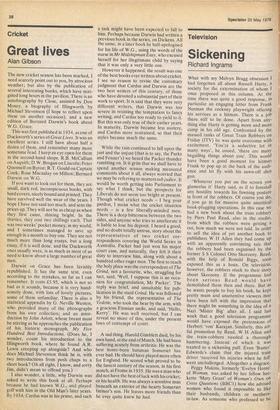Cricket
Great lives
Alan Gibson
The new cricket season has been marked, I need scarcely point out to you, by atrocious weather; but also by the publication of several interesting books, which have mitigated long hours in the pavilion. There is an autobiography by Close, assisted by Don Mosey, a biography of Illingworth by Michael Stevenson (I hope to reflect upon these on another occasion), and a new edition of Bernard Darwin's book about W.G. Grace.
This was first published in 1934, as one of Duckworth's series of Great Lives. It was an excellent series. I still have about half a dozen of them, and remember many more sometime read. I keep an eye open for them in the second-hand shops. R.B. McCallum on Asquith; D.W. Brogan on Lincoln; Peter Quennell on Byron; R.T. Gould on Captain Cook; Rose Macaulay on Milton; Bernard Darwin on W.G.
If you want to look out for them, they are small, dark red, inconspicuous books, with hard covers, nicely bound and printed. They have survived well the wear of the years. I hope I have not said too much, and sent the prices up. They will not be as cheap as when they first came, shining bright. In the thirties, they cost two shillings each. That was two weeks' pocket money, in my world, and I sometimes managed to save up enough in a month to buy one. They are not much more than long essays, but a long essay, if it is well done, and the Duckworth ones usually were, is as much as most of us need to know about a large number of great men.
Darwin on Grace has been lavishly republished. It has the same text, even according to the mistakes, so far as I can remember. It costs £5.95, which is not so bad as it sounds, because it is very hand somely done, with lots of lovely pictures, some of them unfamiliar. There is also a statistical appendix by G. Neville Weston, who provided many of the photographs from his own collection; and an introduction by John Arlott, whose breast must be stirring as he approaches the publication
of his historic monograph, My Five Hundred Best Introductions. (Does he, I
wonder, count his introduction to the Illingworth book, where he found A.R. Lewis creeping up alongside? And who does Michael Stevenson think he is, with two introductions from posh chaps to a short book? Oh all right, I know, and sorry Jim, didn't mean to offend you.) I also wonder, a little, why Darwin was asked to write this book at all. Perhaps because he had known W.G., and played golf with him in the Old Man's later years. By 1934, Cardus was in his prime, and such
a task might have been expected to fall to him. Perhaps because Darwin had written a previous book in the series, on Dickens. All the same, in a later book he half-apologised for his life of W.G., using the words of the nurse in Mr Midshipman Easy, who excused herself for her illegitimate child by saying that it was only a very little one.
However it happened, the result was one of the best books ever written about cricket. I see no reason to revise the customary judgment that Cardus and Darwin are the two best writers of this century, of those who have devoted a substantial part of their work to sport. It is said that they were very different writers, that Darwin was too severe in resisting the temptation to fancy writing, and Cardus too ready to yield to it. But this was only true of their earlier years. In maturity, Darwin became less austere, and Cardus more restrained, so that their styles became much the same.
While the rain continued to fall upon the just and the unjust (that is to say, the Parks and Fenner's) we heard the Packer thunder rumbling on. It is grim that we shall have to spend another season making measured comments about it all, always worried that we may be referring to matters sub judice. It would be worth getting into Parliament to say what I think, but the prospects for Liberals do not seem too bright at present. Though what cricket needs — I beg your pardon, I mean what the cricket situation needs — is a few liberally-minded men. There is a deep bitterness between the two sides, and anyone who tries to ameliorate it is liable to lose his deposit. I heard a good, and no doubt totally untrue, story about the representatives of two cricket correspondents covering the World Series in Australia. Packer had just won his major court case, and naturally, they felt it their duty to interview him, along with about a hundred other eager men. The first to reach the holy place was the correspondent of The Grind, not a favourite, who, struggling for tact, said, 'Well, I suppose this is an occasion for congratulation, Mr Packer'. The reply was brief, and unsuitable for publication in the staid Grind. He was followed by his friend, the representative of The Vedette, who took the bear by the arm, with a gracious Etonian smile, and said, 'Hello,
Kerry'. He was well received, but I can reveal no more of this, under the present laws of contempt of court.
A sad thing. Harold Gimblett died, by his own hand, at the end of March. He had been suffering acutely from arthritis. He was the best home-born batsman Somerset has ever had. He should have played more often for England. He scored what proved to be the fastest century of the season, in his first match, at Frome in 1935. He was a man who sdid not have the best of luck with his cricket, or his health. He was always a sensitive man beneath an exterior of the hearty Somerset farmer's son. He leaves more friends than he ever quite knew he had.


































 Previous page
Previous page